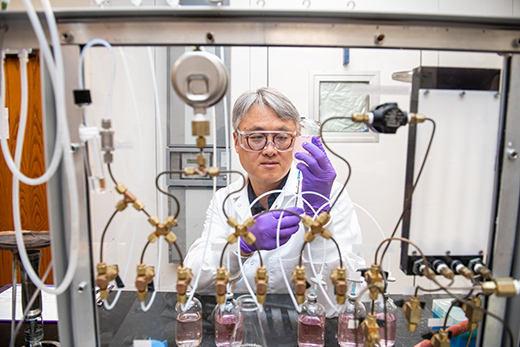Im receives NSF CAREER award for quantifying nitrous oxide emissions in forage conservations
Friday, May 27, 2022

Jeongdae Im, Jeffrey and Joy Lessman Keystone research scholar and assistant professor in civil engineering at Kansas State University, works in his lab on the K-State campus. His recent CAREER award from NSF involves quantifying nitrous oxide emissions from forage conservations. | Download this photo.
MANHATTAN — A Kansas State University professor seeks to better understand and quantify emissions of nitrous oxide, a potent greenhouse gas, from agricultural forage conservation with a more than $600,000 Faculty Early Career Development, or CAREER, award from the National Science Foundation.
Jeongdae Im, Jeffrey and Joy Lessman Keystone research scholar and assistant professor of civil engineering in the Carl R. Ice College of Engineering, is investigating the nitrous oxide emissions from forage conservation, which is the practice of stockpiling plants or parts of plants that serve as food for livestock. This process often relies on fermentation, as the lactic acid produced works as a natural preservative for forage crops. But microorganisms that produce greenhouse gases also thrive in this environment.
The project, "CAREER Mechanisms and control of nitrous oxide emissions from forage conservation," aims to provide a understanding of the conserved forage biome and open up a new avenue toward eco-friendly forage management and a sustainable cattle industry.
"Current nitrous oxide emission inventories from agriculture only track emissions from soil management, manure management and field burning of agricultural residues," Im said. "This project will focus on nitrous oxide emissions from forage conservations as an abundant and yet unaccounted source of this greenhouse gas from agriculture and farming."
Im will carry out an integrated laboratory and field research program to quantify nitrous oxide emissions in forage conservations while also investigating the microbial processes that control such emissions. His prior research has already identified a potential solution to this issue which reduces nitrous oxide emissions by 95%. Im has filed a provisional patent and is collaborating with Corteva AgriScience to develop a novel inoculant.
"The outcome of this research will also address one of NSF's 14 grand challenges for engineering in the 21st century, in this case, managing the nitrogen cycle," Im said. "It should accelerate our ability to design and implement safe, effective and sustainable agricultural resource management strategies going forward."
